It was the 20th anniversary of the Collingwood Elvis Festival—the largest Elvis festival ever—and over 100 Elvis tribute artists came in from around the world. Not in Memphis, but cottage country, Ontario, about an hour-and-a-half outside Toronto.
“We’re here to keep his memory alive,” they say, or, “if Elvis were here today he’d be overwhelmed.” And perhaps they’re right, but maybe it doesn’t matter. It’s just a bunch of people, and it’s summer, and the sun’s out, and the main street of a town of 20,000 is closed off, and there are hot dogs too.
Videos by VICE
I arrive just after 10 in the morning.
The first thing I see after the turn-off is a Dairy Queen, whose big white board reads, “Welcome all Elvises!”
“I’m not Elvis,” a man offers to me. “I’m not going to be him, nobody is going to be him.” And yet for 16 years, Bruno Nesci has been paying tribute to the King, singing and dancing in places as far away as China, doing something that he knows will never pay the bills. “I do it for the love of Elvis,” he says. Nearby a slightly shorter, jumpsuit-era Elvis adds, “It’s about feeling you’re him, not thinking you’re him.”
“People just have to experience it,” says a man from Pennsylvania, not even pretending to be Elvis. “I’ve been to Graceland nine times, I was born 50 miles from his last performance.”
For ten hours the main stage belonged to Elvises of all kinds—Mexican, Australian, German, Canadian—each one taking his (or her) turn; each one, at the end of their song, being offered a single, red, perhaps not-so-genuine rose. Hank Poole, dressed Vegas-era Elvis, doesn’t even crack a smile. “When I am on stage singing Elvis songs it comes from deep within my soul,” his bio reads, “I am 100% available for photographs anytime and I can’t wait to meet you.” He is eight years old.
Beyond the stage stretches an ocean of old people, six small-town city blocks deep. There are camcorders, Tilley hats, polite applause, and comfortable shoes. Each one sits in his or her own folding chair, brought in from home, and left there, to save their place, Thursday through Sunday. But between the stage and the first set of seats is an area just big enough for a little bit of dancing, followed by several rows worth of wheelchairs and the people in them. They’re out in strong numbers, and enjoying themselves.
Through the sidewalk crowd, making his way slowly moves one man, confident and radiant, pausing for photos. “Who are you?” I ask him feeling a little weirdly starstruck. “Past champion,” he says, “past multiple champion,” and it turns out it’s true (Non-Professional Division, Early Years Elvis). He’s about 65, good and fit, with uncomfortably wonderful teeth.
“I could tell you all the shit that they say,” he says, “that Elvis was the King, that his music will never die, and all that crap. But I’ll tell you why I do this: I do it for the women.”
“What kind of women do you get?”
“Quite often much younger than I am—and I don’t chase women.” To me, dressing up like Elvis and pretending to be Elvis, and going up on stage in Collingwood and singing an Elvis song sounds like, if nothing else, chasing women, especially if that’s how you get women—but I keep it to myself. Also, there were no younger women.
“How did you get women pre-Elvis?” I ask. The answer is something about “mobile disc jockey” and “regional accounts manager,” but it’s hard to make out amidst all the smiling and talking. There isn’t even room to stand.
“Certain frequencies,” he says. “It’ll hit women with these certain frequencies. Elvis, his voice, one time I made a woman cum with a certain frequency.” He explains and then shows where the eeee and the oooo sounds come from, how he learned how to sound like Elvis from a simple recording of his speaking—”never from his singing”—and then makes clear yet again that he writes not only all of his own jokes, but his material as well.
He leaves with a wink and presumably much better things to do, and it feels like the time to head off to the Loblaws in search of some food and a bit of normalcy. Once inside, I run into two Elvises wandering together through the produce section. I stop three women my mother’s age and tell them about pick-up artist Elvis. “Is that sexy?” Would you sleep with one of those guys?” They laugh off the question—but how can it be denied? The voice, those hips, the curl of the lip, the rock n’ roll, the King. And yet, they feel what they’re feeling because they were there—they lived it. For everyone else, it’s hard to know just what’s being kept alive.
Security at the event is lax, and a police officer gives me a quizzical look. “It’s pretty tame.” A man sweeping the street, however, remembers one time when one Elvis got into a fight with two other Elvises. “They threw him in the tank and let him dry out,” he notes casually, “the next morning he got to his show.” The man wears his work gloves, a reflective orange safety vest, and fake Elvis glasses and sideburns.
A little while later, everything stops as Priscilla Presley takes to the stage, and I can’t help but feel a kind of awe and expectation. It’s her first time at any Elvis fest apparently (she’s uncomfortable seeing the Elvises a city counsellor tells me) and she ends up staying for only about five minutes. Demure, soft-spoken, and quite lovely at almost 70, she tells a story about how Elvis, as a GI stationed over in Germany, showed her a scrapbook of photos his fans had sent in of themselves, and how he’d felt his fans were the greatest in the world. Then she mentions the book about Elvis that she’s selling, says thank you and goodbye, and gets into a big black Chevy Suburban and is escorted off the grounds by two guys on ATVs. Later she would attend a $100 cocktail reception, hosted by the mayor.
In addition to the free-for-all street party, little private Elvis shows are held all over town. At The Olde Town Terrace Restaurant, about five doors down from the main stage, $38 gets you dinner, a show, and something called “feel,” tax included. It’s poorly lit inside and Hawaii Elvis sings what is, in fact, pretty pleasant dinner karaoke, while everyone else focuses in, head down, on their food.
At the end of the long day, just outside of whatever official areas, concert-years Elvis appears to be walking to his car, perfectly coiffed, full jumpsuit, knapsack in hand. Every two steps, though, he’s stopped for a hug, a signature (they sign their own names, not Elvis’) or a photo, all of which he appears almost too happy to give. He takes his time—patient, gentle, genuine, and sincere.
“It really brings back memories,” a woman says, looking over. “We think we’re 16. It’s very sexual. I’m going to go home and dance.”
“My grandma wanted to come,” says a guy maybe 30, “not much to do in Midland.”
And it begins to make sense.
“I wish there was a Neil Young.”
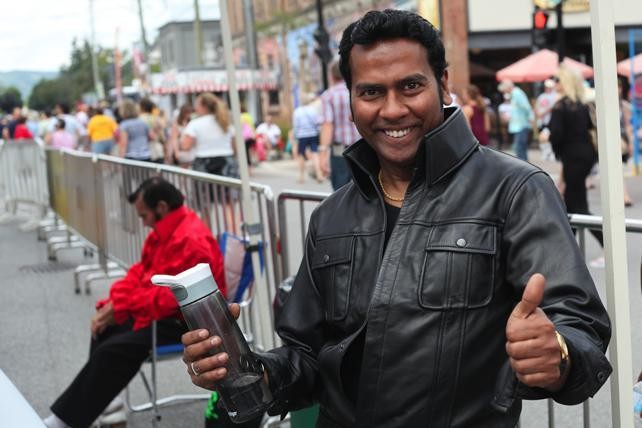
Sam Catalfamo
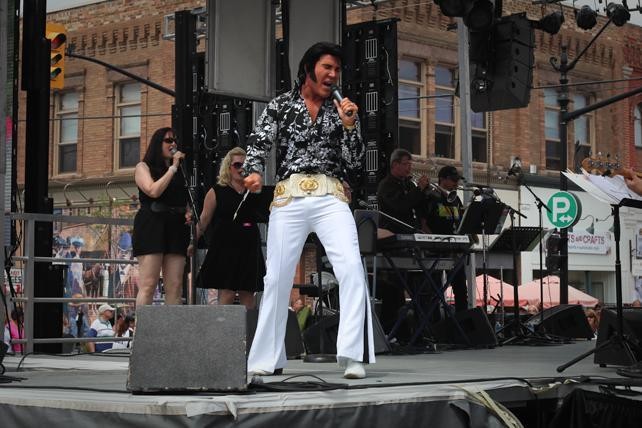
Sam Catalfamo
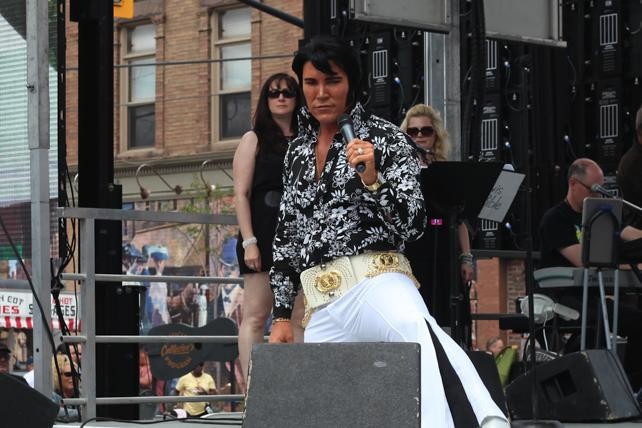
Sam Catalfamo
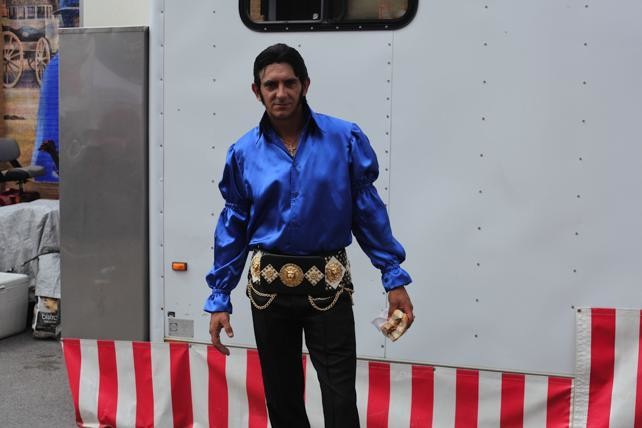
Sam Catalfamo
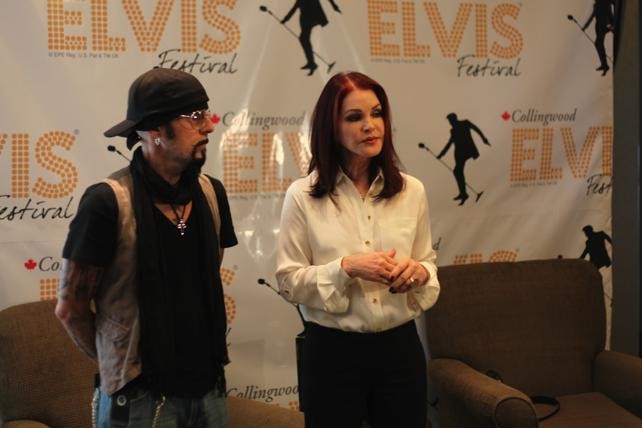
Sam Catalfamo
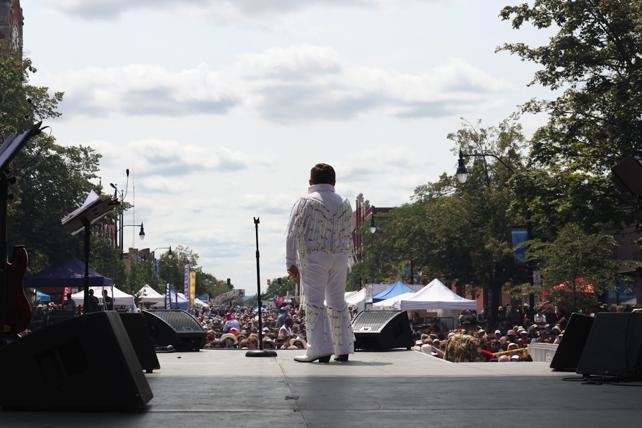
Sam Catalfamo
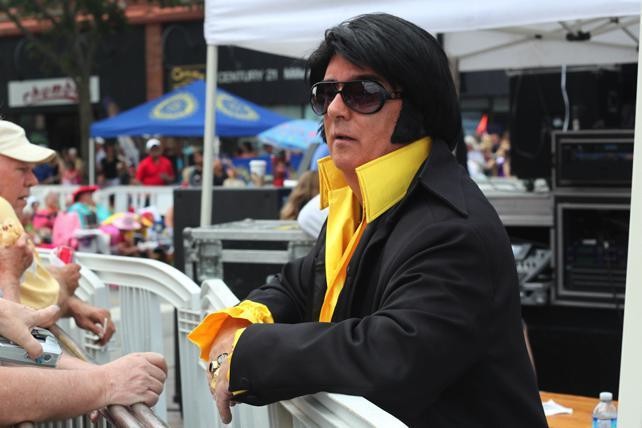
Sam Catalfamo
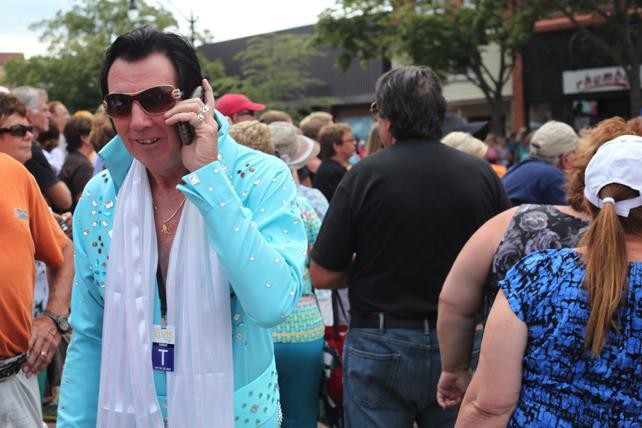
Sam Catalfamo
More
From VICE
-

Nick Fuentes, a white supremacist streamer and US social media pundit, appears to mace 57-year-old Marla Rose, a 57-year-old on his doorstep on Sunday, November 10 (Imagery courtesy of Marla Rose) -

-

WWE

